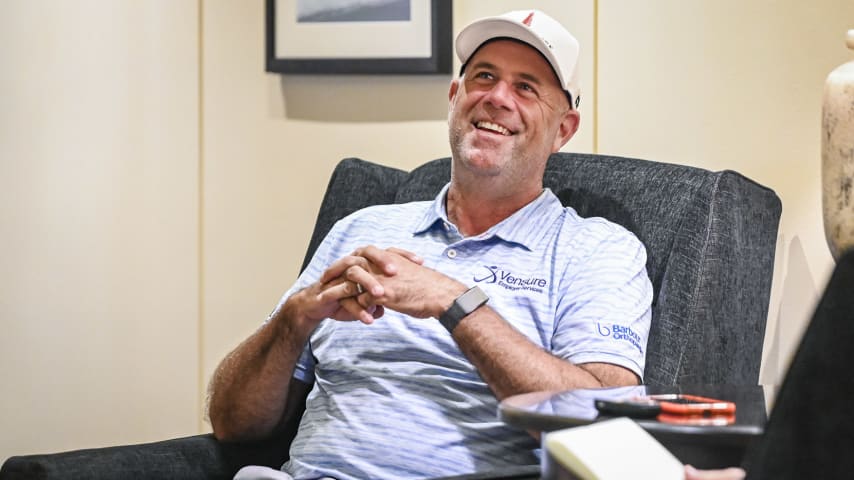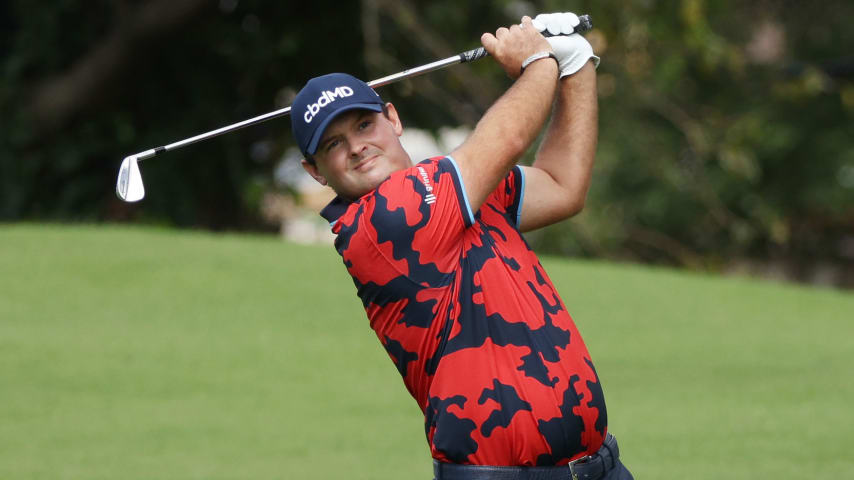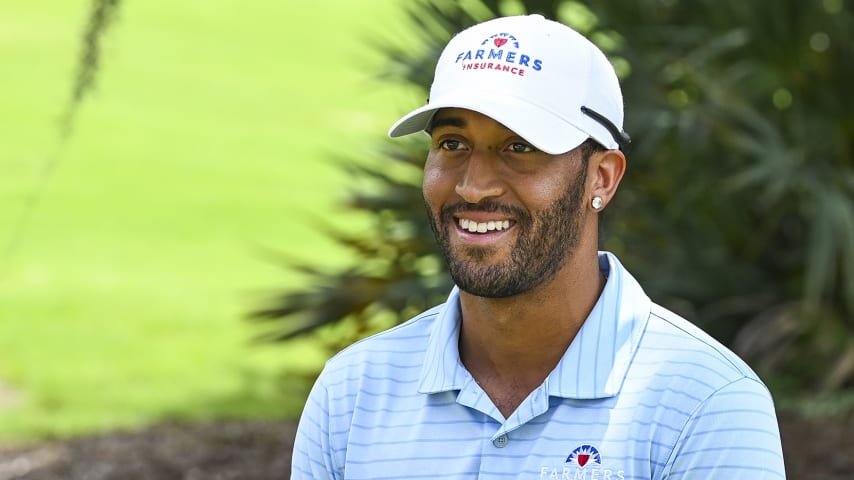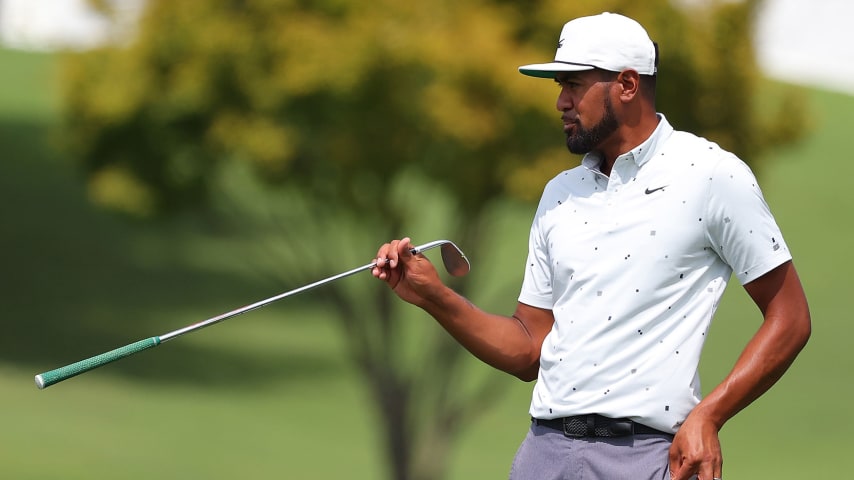Q&A with resurgent Stewart Cink on the verge of his first TOUR Championship
18 Min Read

MEMPHIS, TN - AUGUST 05: during the first round of the World Golf Championships-FedEx St. Jude Invitational at TPC Southwind on August 5, 2021 in Memphis, Tennessee. (Photo by Keyur Khamar/PGA TOUR via Getty Images)
A resurgent Stewart Cink is on the verge of his first TOUR Championship since 2009
Written by Cameron Morfit
A resurgent Stewart Cink is on the verge of his first TOUR Championship since 2009

Stewart Cink swing comparison from 2004 to 2021
Stewart Cink was ready for battle when he faced Collin Morikawa at the RBC Heritage at Hilton Head in April. Granted, he had a five-shot lead, but Cink was on the doorstep of PGA TOUR Champions eligibility, while Morikawa, half his age, was one of the hottest players on the planet.
It turned into a mismatch, all right, but not in the way some might have imagined. Cink carded a bloodless 70 and win going away, while Morikawa, after starting with a birdie, fell back and ultimately signed for a 72 (T7).
Underestimate Cink, a two-time winner this season, at your peril. He’s cagey. He’s crafty. And today might just be the day he shoots the fur off the course (a Cinkism). Here, he sits down with the PGA TOUR to talk about sharing his prime years with Tiger Woods; his pro shop management career that wasn’t; and what exactly it did for him to win the Mexican Open – twice.
PGA TOUR: Your best years, from 2000 to 2010, overlapped with Tiger’s best years, which came into focus with your playoff loss to him at the 2006 WGC-FedEx St. Jude Invitational at Firestone South. If you could go back 20 years and give your 28‑year‑old self some advice, what would it be?
STEWART CINK: I remember stressing out a lot. I remember thinking that I should be winning, I should be – I was at the top of the game. I never was the No. 1 player in the world, but I was ranked high. I just remember sweating it.
And that hurt you?
SC: I’d tell that 28‑year‑old to stop sweating it because worry just doesn't really get you anywhere. I was comparing reality to what my expectations were and that's dangerous. I've learned that expectations are killers and you have to properly manage your expectations out here if you're going to be successful.
What was it like to play peak Tiger?
SC: He personified what you imagined as perfect golf. He had the length, he had the accuracy, he had the control, he had the short game and the putting, and he had on top of that the mental strength. He didn't have a single weakness.
I would imagine it probably felt like what NBA players feel when they play against a guy like Giannis, who is tall, he can handle the ball, he's quick, he's got good instincts, he can rebound and he's very physical. It's probably about like that.
And an airtight mental game.
SC: Yeah. How do you compete against that? I played with Tiger at least half a dozen times on Sunday when he finished first. Just to see him at his best was a treat. It was demoralizing and it was inspiring kind of all at once.
You birdied 16 and 17 to force a playoff with Tiger at Firestone in 2006. Although he birdied the fourth extra hole to win, was it a confidence-booster?
SC: That was a big moment for me because I took Tiger all the way to the finish, and it was a long playoff. I didn't quite come out on top, but I was proud that I didn't back down. I saw it through. I had to make some clutch putts on the last couple holes to force the playoff and did so – I took it to him; I just didn't quite finish it off.
Eight PGA TOUR wins, one major (2009 Open Championship), three Korn Ferry Tour wins, five Ryder Cup teams, four Presidents Cup teams. Have you underachieved, overachieved, or gotten it just right?
SC: This goes back to those days when I was stressing out, 2000‑2010, when I let myself start thinking about what I should be. And I did that because people were telling me what I should be: ‘You have the game to win five tournaments a year.’ But I wasn't doing that, so I started feeling like I was underachieving.
I still feel like I could have brought more to the table. Even though I've had a couple wins this year, I've also missed seven cuts or something like that. There are times when I've had a lot of game going into an event and finished 30th – so, I’d have to say I underachieved.
You joined the TOUR in '97. What's the biggest difference between then and now?
SC: Almost everybody can win; the fields are just incredibly deep. The technology like Track Man and all the information with your coaching, biomechanics, conditioning, sleep, all the different things that add up to a guy like me who's 48 and can still compete. Twenty years ago, when you're my age, you're done. You’re waiting until you’re 50.
You've worked hard with trainer Cornel Driessen. How much longer are you now?
SC: I gained about 10 to 15 yards statistically from the end of last season to this season. Cornel was a factor. He worked me through an injury in '19 that kind of formed the basis of me getting stronger in some areas, and then I was able to change my technique a little bit to make my delivery of the clubhead a little bit more efficient to the ball.
Did these inefficiencies show up on a launch monitor?
SC: A hundred percent. And the eyeball also, you can see it. I was driving the ball nice, but I was driving it a little low with a lot of spin. Technical‑speak here, but when you drive it low, you need spin to make it look real pretty and it was looking real pretty. I was hitting fairways and playing good golf but losing carry and not getting results.
Your short-game coach, James Sieckmann, nudged you to change?
SC: My swing coach, Mike Lipnick, encouraged me to move the ball position a little bit forward to be more efficient. I was like, ‘I don't know, I'm driving it pretty nice.
Then James, who looks at my stats, said, ‘You're inefficient with your driver. Your body's big, you've got a lot of width, you've got technically a nice swing. What would happen if you tried to take advantage of what's in there a little bit more?’ He tweaked my ball position and helped the way I loaded my backswing into my bigger muscles.
After my visit with Sieckmann, I went to Lipnick and said, ‘All right, I'm with you now.’ Because I had seen the difference on the launch monitor.
You tapped your son Reagan to be your caddie this year. What did that do for you?
SC: It put me in a winning frame of mind. That's a foundational piece of this; we have a great relationship, and he and I think the same way on the golf course. He's a high‑IQ thinker. He's not a professional golfer but he thinks like a professional golfer. He sees every golf shot the way I see it, the way the players see it, the way caddies see it.
We always arrive at common ground. We don't always agree, but we always arrive before I hit the shot. Sometimes it goes my way, sometimes it goes his way, but he's just got a really good decision‑making mind and in golf, it's a big part of it.
He has an electrical engineering degree?
SC: Industrial engineering. He's an optimizer.
He helped optimize his father.
SC: Yeah. I experience zero conflict with him. I think it's a 7‑iron, he thinks it's a 6‑iron. With all my professional caddies, there would be conflict, like – who's right? If I chose my club, I would feel pressure to make that work because I didn't want to be wrong. If I chose his club, there would be pressure. With Reagan, I don't experience that. We always arrive at a common solution before we make the shot and then that puts us in a frame of mind where both of us are really willing to accept the results.
But he's gone after this season?
Yeah, he's only going to caddie for me through the rest of the FedExCup.
You upsized your drives but downsized your house, leaving your place near TPC Sugarloaf for an apartment in the city in Atlanta. What has that been like?
SC: It's been great, we've really enjoyed it. We're right in the middle of midtown Atlanta on Peachtree Street. The city is both sides of us all around. We've got parks in the back. Georgia Tech is right there. It's a neat area. We're just – we've lived in the suburbs for so long that we just wanted a change of scenery, I guess. Between now and maybe if grandkids come at some point. Pretty soon we'll have two kids married and maybe a grandkid comes at some point. At that point we may be thinking more less urban.
Who's been your most fun teammate on all those Ryder and Presidents Cup teams?
SC: I enjoyed playing with Rickie. His first Ryder Cup (at Celtic Manor in 2010) was my most recent one, in Wales. Anyway, he was like, what, 14 years old? He was a practical joke guy. Like, he would hide in boxes in the hallway. You’d get stuff delivered and put the box out in the hallway. Later you had to like kind of brace yourself at every box because you never knew which one Rickie was going to pop out of.
What team was especially fun to be a part of?
I really enjoyed the K Club (in 2006). Tom Lehman was the captain; the match wasn't very close, but we had a really good team room, and I fell in love with Guinness. I only won one Ryder Cup as a player, in Kentucky (in 2008). Winning that was just an unbelievable feeling in golf. I wish I could have experienced more of that.
Well, you got to experience it with the Presidents Cup.
SC: Got to experience it with the Presidents Cup.
You won the '96 and '99 Mexican Opens. Favorite memories from those victories?
SC: In '96 I played great on the Nike Tour, now Korn Ferry Tour, and finished first, so I was headed to the PGA TOUR. Maybe a few weeks after the season ended, I get invited to the Mexican Open and it's only like 50 players. It's players from Mexico all the way down to South America, and PGA TOUR players at a place called Club de Golf Mexico, in Mexico City. Major high elevation, very narrow. It was like Riviera at 7,500 feet.
So I go down there and go toe to toe in the last group on Sunday with Bob Tway, who's 10 years off his last major championship. So that was a great experience for me. I had a friend caddying, played really good, was strong down the stretch.
Then in '99 I went down there and matched up kind of in the opposite way against a local young player who just played awesome. He threw like a 65 at me the last day in the last group and I had to keep pace with him. That was another great experience. I'm not going to say it was the Masters, right, but playing against PGA TOUR players, veterans and young players, and winning, was a very important part of my career.
Your buddy Zach Johnson called you The Basket Case for a while after you posed on the couch for a long Q & A in Golf Magazine. That was the last time we talked in depth. Are you still on the couch with anybody and what do you talk about?
SC: I've tried different approaches. I've worked with sports psychologists, therapists, life coaches – I'm interested in it, and I think it's a solid frontier in golf. We all have skills. I can hit my driver, so can they. We can all do all parts of the game, but there's a frontier where you can get an edge and I think if you can keep your heart and your mind in the right place more often on your shots, on your putts, then you just give yourself a better chance to succeed.
I’m not working with anybody right now, but I'm letting James Sieckmann in a little bit more because he studies the stats and is an expert on learning. I'm constantly trying to leave good imprints on my memory when I practice, and I try to practice efficiently. I don't practice like I used to. I’ve learned that practice is a quality, not a quantity thing.
You, Kenny Perry, Julius Boros and Sam Snead are the only guys to win multiple TOUR events in a season at 47 or older. Are you a top‑10 thinker on TOUR?
SC: There's a lot of good thinkers out here and I'm one of them. It's kept me relevant out here. You won't see me at the top of any of the statistical categories except maybe greens in regulation. Part of that is decision making, choosing the right club, figuring out what the wind is doing, what the lie is doing in the rough. Making sensible decisions on the course is like being a tough out in baseball.
Did you take that to an even higher level with Reagan?
SC: Yeah, which enhanced that sensible decision‑making and kept me from wavering. As I get older, the one thing that I've really had to pay attention to has been not physically – I'm not weaker than I was, I'm not hurting or anything – but my intensity and my focus.
Phil Mickelson has said that.
SC: He and I have talked about that. Decision making doesn't seem challenging, but the more decisions you make early, the more fatigued you get late in the day. Important holes happen late in the day. The best example I can think of is Tom Watson's finish at The Open Championship when I played against him (in 2009). He hit the ball on the last hole a little bit farther than he should have hit it, and I think he knows that, and it carried on the green. All the balls that ended up near the hole were landing short of the green there. I think that was a decision‑making error that was caused by fatigue.
It's such a fine line.
SC: Almost every tournament every week is won or lost by someone making a correct decision or someone losing it with just a slight mistake. That usually is caused by fatigue or just a blink. It just happens so fast and a lot of times it's imperceptible.
Some of your contemporaries like Jim Furyk, Steve Stricker and Tiger are captaining Ryder Cup and Presidents Cup teams. Are you interested in that?
SC: Of course. I would love to. I love playing on those teams, I love being part of those teams and I would love to do that.
Your staying power on TOUR has been quite lucrative. Have you allowed yourself any toys like an unreasonably expensive sports car?
SC: No, I'm not really a car guy, but we had an unreasonably expensive boat at our lake house. Having a lake house is unreasonably expensive in itself. It was at Lake Keowee up by Greenville, South Carolina. By Clemson, actually. It was a hundred miles from our house. We sold our house in Sugarloaf and we sold the lake house within about three, four months of each other just to sort of scale things down in our life.
What's the best shot you ever hit on TOUR?
SC: Easy. I was playing with Woody Austin, final round of the 2004 RBC Heritage, which I ended up winning in a playoff. But I played really well that day, I came from nowhere, I was like eight or nine shots back starting the day.
On the 13th hole, the pin was cut down in the front of the green right where – it's the hole that has the bulkheads around it in the bunker, you know? So I hit my second shot and it landed on the boards, I believe, or maybe it just missed the boards but it basically stopped at the bottom of the boards in the sand and I was just looking at the wall.
Because of the angle of the boards, I felt like if I hit a shot that hit up the boards and shot up in the air, it would probably go high enough but wouldn't come backwards. It would probably bounce off the boards, go up in the air and get to the fringe and then roll down the hill, because it was straight downhill to the hole. And it came off like a dream. I hit it straight up the boards with a lob wedge, the ball went up in the air and landed on the green, rolled out to a no‑brainer gimmie. Woody just about had a heart attack.
What's the best shot you ever saw someone else hit?
SC: Paul Casey made a hole‑in‑one to end our match at the Ryder Cup against me and Zach. A walk‑off hole‑in‑one in the Ryder Cup on European soil, not his home soil but European soil, the K Club. It was about the 14th or 13th. I've seen some unbelievable shots, but in the moment to hole out from a par‑3 tee – yeah.
It seems like a foregone conclusion now, but did you have any doubts about your ability to make a career in competitive golf? It’s so hard to make it.
SC: It is, but I never really had any doubts, and the reason is I never envisioned myself doing this. I wasn't one of these kids that went to the golf course every day and just imagined myself as a PGA TOUR player.
What did you think you were going to do?
SC: Well, I remember I was about 15 or so, maybe 16 and I won a big AJGA match play, like one of their majors, and I was nobody. I just barely got in the field. I had only played in the few AJGAs in my career and I wasn't expected to do much and I beat top player after top player after top player and I ended up winning.
I remember the interview at the end because my wife shows it to me all the time, she mentions it to me all the time. They said, ‘What do you plan on doing? Do you plan on going on the PGA TOUR?’ I said, ‘I'll probably hopefully go into like pro shop management.’ That was my answer.
So the lesson is to dream big?
SC: Yeah. I never was a dreamer. I always wanted to see if I could be better today than I was yesterday. I don't really do goals, I do like, what's the best I can be today? Because I never really saw myself out on the PGA TOUR, I never really had any doubts. I never had to compare what I was doing to what my dreams were because I didn't have any.
Who did you beat in those matches?
SC: Justin Leonard in the finals or semis. Trip Kuehne was one of them, he was a top guy. Then along the way another guy who played at Stanford named Brad Lehman and a couple other guys who you wouldn't know now.
None of those guys won twice this season.
SC: No. And I knew I was always good because I grew up in Alabama, I was winning from the get‑go. From age 8 I was winning tournaments, but I just never had that like, I never had that thought in my head. I hesitate to say I didn't have the belief because I did, I just didn't really – that wasn't something I was going for.
I wanted to get a college scholarship to get out of my town, and I did that. And once I got to Georgia Tech, I mixed in with guys right away and made the team every time, never missed a tournament, and soon I was winning. I was watching David Duval on my team and then next thing you know I was All‑American and then I was Player of the Year.
You won so many Player of the Year titles it’s hard to keep track.
SC: I had a pretty good stretch. In '95 I was the College Player of the Year and in '96 I was the Korn Ferry Player of the Year and '97 I was Rookie of the Year on TOUR.
That's the way to do it.
SC: Yeah. But none of that really changed me. I still don't look out there and think that's my target. I just think little, like what can I do today to get better than yesterday. I don't feel old, I don't feel 48; I feel like one of these young guys. I just don’t have anything in common with them. I don't feel like my body's trying to give up, not one bit.












